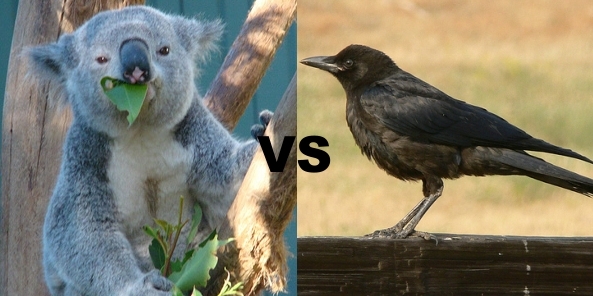
When it comes to your marketable job skills are you a koala or are you a crow?
Koalas are super-specialists. Over the past few million years they’ve managed to evolve the capability to eat and metabolize poisonous eucalyptus leaves. This is great for the koalas because it ensures a stable food supply. When it comes to finding lunch, koalas have very little competition. There aren’t many other animals out there who’d be able to steal from the koala’s dinner plate. They’d die if they even tried. Because there’s little competition, the koala can afford to sleep, be lazy, and eat leaves all day long. Not a bad life.
The crow, on the other hand. Is an example of the super-generalist. Crows will eat anything: fruit, meat, vegetables, worms, garbage–even small animals. Anything they can get their beak around, they’ll eat it.
Crows, generalists as they are, don’t have it as easy as the Koalas do. After all, they have to compete with all the other birds, rodents, and scavengers for a day’s sustenance. For them, day to day life is a never-ending ordeal of hunting and foraging for scraps.
Crows vs. Koalas in the Job Market
In the job market, koalas have long been favored over crows, but that’s soon to change.
Up until now, those who have invested the time to develop a highly-specialized skill set, like koalas, have managed to make pretty easy livings for themselves. Because these specialists have spent so much of their life devoted to becoming a master of a narrow niche, few can compete with their skill level in that niche. They’re the best at what they do, and can often charge very high rates for their services. Because they’ve invested so much time training themselves to become specialists, they’re able to enjoy the luxury of making more money and doing less work.
Those with a more generalized set of skills don’t seem have it so easy. Because they haven’t devoted themselves to the development of a specialized skill set, they’re forced to “forage for scraps” and fight off the competition to land one of those rare job openings that require a lower level of skill.
For the longest time, being a specialist has always seemed to be the safest career decision, but actually, it’s not as safe as you might think. As a specialist, it’s very easy to get a job when your skills are in demand, but it’s much easier to lose your job when your skills aren’t. Just because you feel you’ve tucked yourself securely into a niche doesn’t mean you’re protected against the very real possibility that your niche will be gone tomorrow.
Market trends could make your job vanish overnight. This has already happened in the memory chip industry. Many electrical engineers whose sole specialty was the manufacturing and design of memory chips enjoyed high demand for their skills for many decades. Then, when Taiwan and Korea developed the capability to produce the same chips at a greatly reduced price, they flooded the market with their cheap chips. The memory chip companies in the States couldn’t compete and many engineers found themselves out of a job.
Unpredictable market trends are not the only job killers out there. Actually, your high-skilled job is much more likely to fall victim to another, much more powerful predator: Technology.
The number one tenet of technological progress is this: make it easier for less people to do more things. As technology progresses, it takes less and less expertise and manpower to achieve the same tasks. Seemingly secure niches that require a high level of expertise today could easily be rendered obsolete by the next big technological advance tomorrow.
Skills are getting cheaper by the minute. A task that may require a team of experts now may only require an unskilled person at a computer ten years from now. This trend is destined to continue until the advantage experts have over generalists in nearly every conceivable field will become negligible. This has already happened in the past, and now it’s happening faster than ever.
Whether you like it or not, the crows are beginning to learn how to eat eucalyptus. If you’re a koala, it might be time to adopt a more balanced diet.
…
Stay tuned for Part II of this series: The Specialist’s Survival Guide. Click here for Part II.
Special thanks to Allan Ecker of the Thingiverse Blog for his thoughts on the cheapening of skills.
Koala Picture by: Brian Giesen
Crow Picture by: Linda Tanner